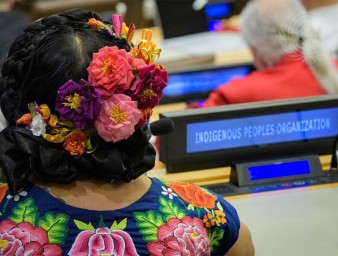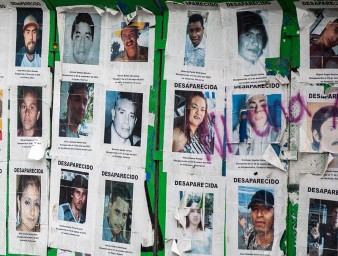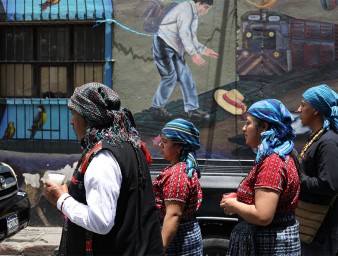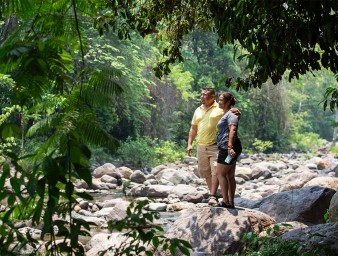Indigenous Peoples: “Isolation is a strategy of collective preservation”
08 August 2024

Tagüide Picanerai is an Ayoreo-Totobiegosode Indigenous defender from Paraguay who has dedicated his life to defend human, environmental and land rights.
"What characterises us is that we are practically the only Indigenous group in initial contact and a group still in isolation that still lives in the rainforest without any contact, outside the Amazon,” Picanerai said. “We are the only uncontacted Indigenous group in the great Paraguayan Chaco."
Picanerai’s desire to protect and expand the Indigenous territory began after his family were forced to leave the Paraguayan Chaco rainforest in the 1970s and 1980s due to deforestation.
The word Chaco comes from the Indigenous Quechua language and means “hunting territory.” In the western region of the country, the Paraguayan Chaco holds a diversity of ecosystems, including dry and sub-humid forests, dunes, savannahs and wetlands.
"I think we are facing big challenges. One of them is the issue of deforestation, because deforestation occurs practically day and night now," Picanerai said.
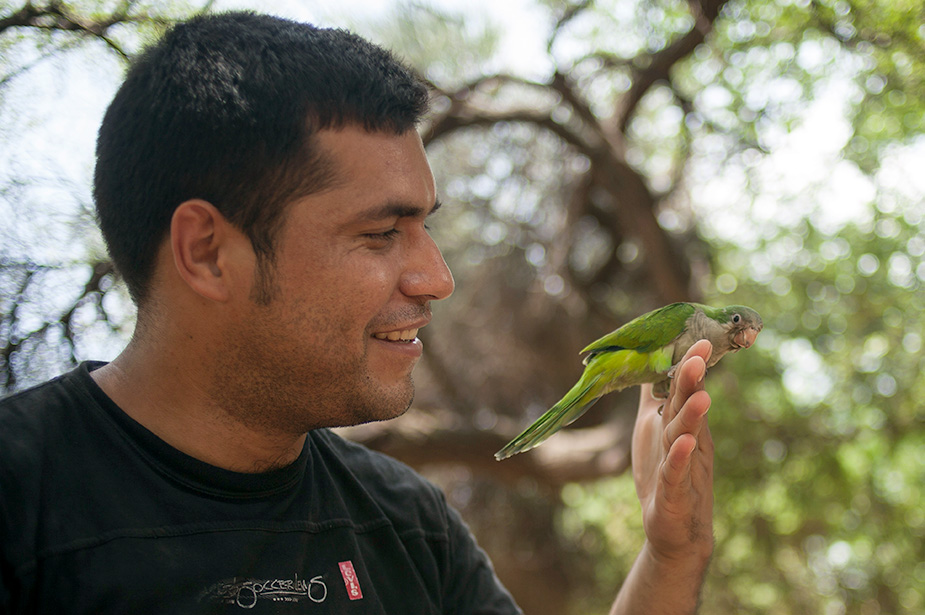
Tagüide Picanerai, Indigenous human rights defender from Paraguay. © Santi Carneri
“
By taking care of the land, we also contribute to society and to the care of the environment, because natural impacts often do not recognise political or cultural ideologies.
“
Tagüide Picanerai, Indigenous human rights defender, Paraguay
Indigenous peoples safeguard 80% of the world’s biodiversity and, according to the UN Declaration on the Rights of Indigenous Peoples, Indigenous Peoples’ knowledge, cultures and traditional practices, including those belonging to Indigenous Peoples in voluntary isolation and initial contact, should be recognised for their great contribution to sustainable development and appropriate environmental management.
“The rapid global demographic growth comes with a respective demand for goods and services, and with that, of course, the increased need for natural resources,” said Valmaine Toki, current Chair of the UN Expert Mechanism on the Rights of Indigenous Peoples (EMRIP). “Subsequently commercial entities are seeking to extract natural resources in areas where isolated groups live. This compromises and threatens their well-being.”
Toki, of Ngati Rehua and Ngapuhi descent, from New Zealand, is an Indigenous law professor at the University of Waikato whose research, writing and teaching focuses on the recognition of Indigenous rights. She was appointed as member of the EMRIP in 2022.
For Picanerai, the recognition of Indigenous Peoples in voluntary isolation or initial contact by the UN is key so that member States implement the recommendations issued by its mechanisms.
The UN has put in place three mechanisms to defend the rights of Indigenous Peoples around the world: the Permanent Forum on Indigenous Issues, established by the UN Economic and Social Council; the Special Rapporteur on the rights of Indigenous Peoples, established by the then Commission on Human Rights; and the EMRIP, established by the Human Rights Council.
“Not only do we have the three mechanisms, but there is a clear direction from articles within the UN Declaration on the Rights of Indigenous Peoples to promote respect for and full application of the fundamental rights and provisions of the Declaration and to follow up on the effectiveness,” Toki said.
The EMRIP conducts studies to advance the promotion and protection of Indigenous Peoples by clarifying the implications of key principles, such as self-determination and free, prior, and informed consent, examining good practices and challenges in a broad array of areas pertaining to Indigenous Peoples’ rights, and suggesting measures that States and others can adopt at the level of laws, policies and programmes.
“The Expert Mechanism has noted that for Indigenous Peoples in voluntary isolation, the right to self-determination should be understood as a guarantee of respect for their decision to remain in isolation, and their right to life may be violated if their right to self-determination is denied,” Toki said.
“Considered by many that isolation is a strategy of collective preservation, allowing Indigenous Peoples to maintain their own systems of thought, cultures, language, and traditions, and to survive the threats caused by any forced contact with the outside world it is also an exercise of their right to self-determination.”
“
Indigenous Peoples in voluntary isolation are traditional knowledge holders. They remain uncolonized and need to be protected.
“
Valmaine Toki, UN Expert Mechanism on the Rights of Indigenous Peoples
In his vision statement “Human Rights: A Path for Solutions,” UN Human Rights Chief Volker Türk stated that Indigenous Peoples have suffered repeated violations to their human rights, including to their traditional knowledge, lands, and resources.
“We need to have robust and consistent standards governing participation, inclusion, safety, as well as free, prior and informed consent for Indigenous Peoples, for all processes, including those at the UN,” Türk said.
UN Human Rights works for the advancement of the rights of Indigenous Peoples including by supporting Indigenous and civil society organisations working for the protection of their rights. This includes the International Working Group of Indigenous Peoples in Isolation and Initial Contact (GTI PIACI), an alliance of 21 Indigenous and civil society organisations from Brazil, Bolivia, Colombia, Ecuador, Paraguay, Peru, Suriname, and Venezuela.
The Working Group is committed to the protection, defence, and promotion of the rights of Indigenous Peoples in voluntary isolation or initial contact in the Amazon and the Gran Chaco.
UN Human Rights has started a process to raise awareness about the situation of Indigenous Peoples in voluntary isolation and initial contact. The aim is to promote and support actions and initiatives by States and other interested parties to enhance the work for the protection of Indigenous Peoples in voluntary isolation or initial contact.
The Office is analysing the challenges faced by Indigenous Peoples in voluntary isolation or initial contact, including the existing gaps and progress made by States in the implementation of the Guidelines on the protection of Indigenous Peoples in Voluntary Isolation and Initial Contact of the Amazon Basin and El Chaco. This information will allow the Office to design a strategy to continue drawing the attention on PIACI’s situation at the national and international levels.
In 1994, the UN General Assembly established that every 9 August commemorates the International Day of the World’s Indigenous Peoples, chosen in recognition of the first meeting of the UN Working Group on Indigenous Populations held in Geneva in 1982. In 2024, the International Day focuses on ‘Protecting the Rights of Indigenous Peoples in Voluntary Isolation and Initial Contact.’
